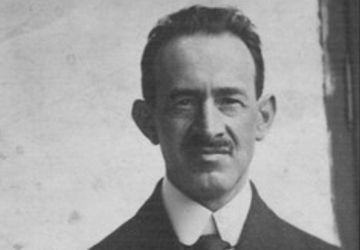Doctor of medicine, military doctor in Wadowice, charitable activities.
Born in 1869. In 1895 he graduated from the Faculty of Medicine at Jan Kazimierz University in Lviv. Later, Dr. Taub settled in Kraków on Siemiradzkiego Street and ran his medical practice there. Looking for a home in the mountain village to spend his vacations, he ended up in Strzyżow, where he settled on today's Koczeli Street with his wife Fryda. There his children were born, daughter Norma and son Henryk .
With the outbreak of World War I, the Taub family left Strzyżów and, fleeing from the Russian army, ended up in Kraków again. Due to the mobilization that included doctors, including those of Jewish origin, he received a military assignment. In 1915, he was assigned to the Stanisławski 20th National Defense Regiment, which was then stationed in Wadowice as an auxiliary formation. He was assigned to the military epidemic hospital. He was then the first Jewish doctor in the town on the Skawa River. After the war, he remained in Wadowice with his family. He was very popular and well-liked by the general public due to his knowledge and charitable activities.
According to some accounts, Dr. Taub was said to have saved the endangered third pregnancy of Emilia Wojtyla, wife of Karol Wojtyla senior. Reportedly, thanks to the Jewish doctor's medical care, Karol Wojtyla junior - later Pope John Paul II - was born on May 18, 1920.
In Wadowice, Samuel Taub was also involved in helping the poorest. He was a benefactor of the 'Bikur Cholim' association in Wadowice, whose members organized free medical assistance for the Jewish poor. A peculiar tribute to his social activities is the epitaph on his grave, which reads: "he dedicated his sacrificial life to the suffering population".
He died in 1933 and was buried in the Jewish Cemetery in Wadowice. On the matzeva is an inscription, in Polish and Hebrew: 'Dr. Samuel Taub. MEDICINE. Born December 1, 1869; Died February 3, 1933; Dedicated his life sacrificially to suffering humanity.'
His son Henryk (1898-1919) wanted to join the Legions at the beginning of World War I, but was underage. Two years later, after graduating from high school, he served in the Austrian 20th Infantry Regiment and fought on the Italian front. At the end of 1918, he reported to the reborn Polish Army and was assigned with the rank of second lieutenant to the Wadowice-based 12th infantry regiment. In 1919 he fought in Cieszyn Silesia, near Zebrzydowice, where he was mortally wounded. In 1939, his body was ceremonially moved to the Wadowice cemetery. In 2018, subpor. Taub was posthumously awarded the Knight's Cross of the Order of Polonia Restituta for defending Silesia.
Daughter Norma (1896-1955) was an extremely intelligent person who spoke several languages. After graduating from medical school, she lived in Kraków. She became the wife of Zbigniew Pronaszko, a well-known Polish painter, sculptor and professor at the Academy of Fine Arts in Cracow. She died in 1955 in Kraków.

